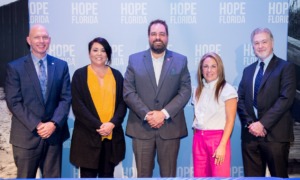This report profiles six successful programs in career exploration and preparation for young people. Youth and youth-serving institutions today, the report says, are subject to new rules: more jobs are available to young people, but they are more demanding. Most jobs are designed for skilled workers, and more require an ability to read and do math at the ninth-grade level, use personal computers, work with groups of people from a variety of backgrounds, communicate effectively orally and in writing, and solve complex problems. Meanwhile, youth are and will be less equipped than ever for demanding jobs, with growing immigrant (especially Hispanic) and former welfare populations facing language barriers, discrimination and other obstacles.
The role of schools and youth-serving agencies must change as well, says the report: they must reorient themselves to respond to today’s workplace demands and help youth prepare for those demands. The programs profiled – in Georgia, California, Massachusetts and the District of Columbia – successfully employ strategies such as: creating partnerships among schools, youth-serving organizations, employers and postsecondary institutions, then linking those partnerships to larger state and federal reform efforts; combining academic work with opportunities for youth to apply what they are learning; and constantly evaluating their progress and using the information
to make improvements. 52 pages. Free. Wallace-Reader’s Digest Funds, Two Park Ave., 23rd Fl., New York, NY 10016. (212) 251-9700. E-mail: wrdf@wallacefunds.org. www.wallacefunds.org.
Report of the Surgeon General’s Conference on Children’s Mental Health: A National Action Agenda
U.S. Department of Health and Human Services
Stemming from the first Surgeon General’s report on mental health, released in late 1999, and reflecting the culmination of a series of informational activities initiated by Dr. Satcher on children’s mental health, this report summarizes the presentations of participants at the Surgeon General’s Conference on Children’s Mental Health, as well as outlining the eight goals developed by the participants to address the issue of children’s mental health in the United States.
The approximately 40 conference participants include researchers, advocates, government officials, community activists, service providers and family members of mentally ill children. Their goals are:
*promote public awareness of children’s mental health issues and reduce stigma associated with mental illness;
*continue to develop, disseminate and implement scientifically proven prevention and treatment services in the field of mental health;
*improve the recognition and assessment of mental health needs in children;
*eliminate ethnic/racial and socioeconomic disparities in access to mental health care;
*improve the infrastructure for children’s mental health services;
*increase access to and coordination of quality mental health care
*train front-line providers to recognize and manage mental health issues, and educate mental health providers in scientifically proven prevention and treatment services;
*monitor access to and coordination of quality mental health services.
These goals are part of an “overarching vision” of the conference participants that fostering social and emotional health in children be seen as a fundamental part of their development, and therefore a national priority. 53 pages. Free. National Institute of Mental Health, Public Inquiries, 6001 Executive Blvd., Rm. 8184, MSC 9663, Bethesda, MD 20892. (301) 443-4513. www.surgeongeneral.gov/cmh/childreport.htm.
– Amy Bracken






























